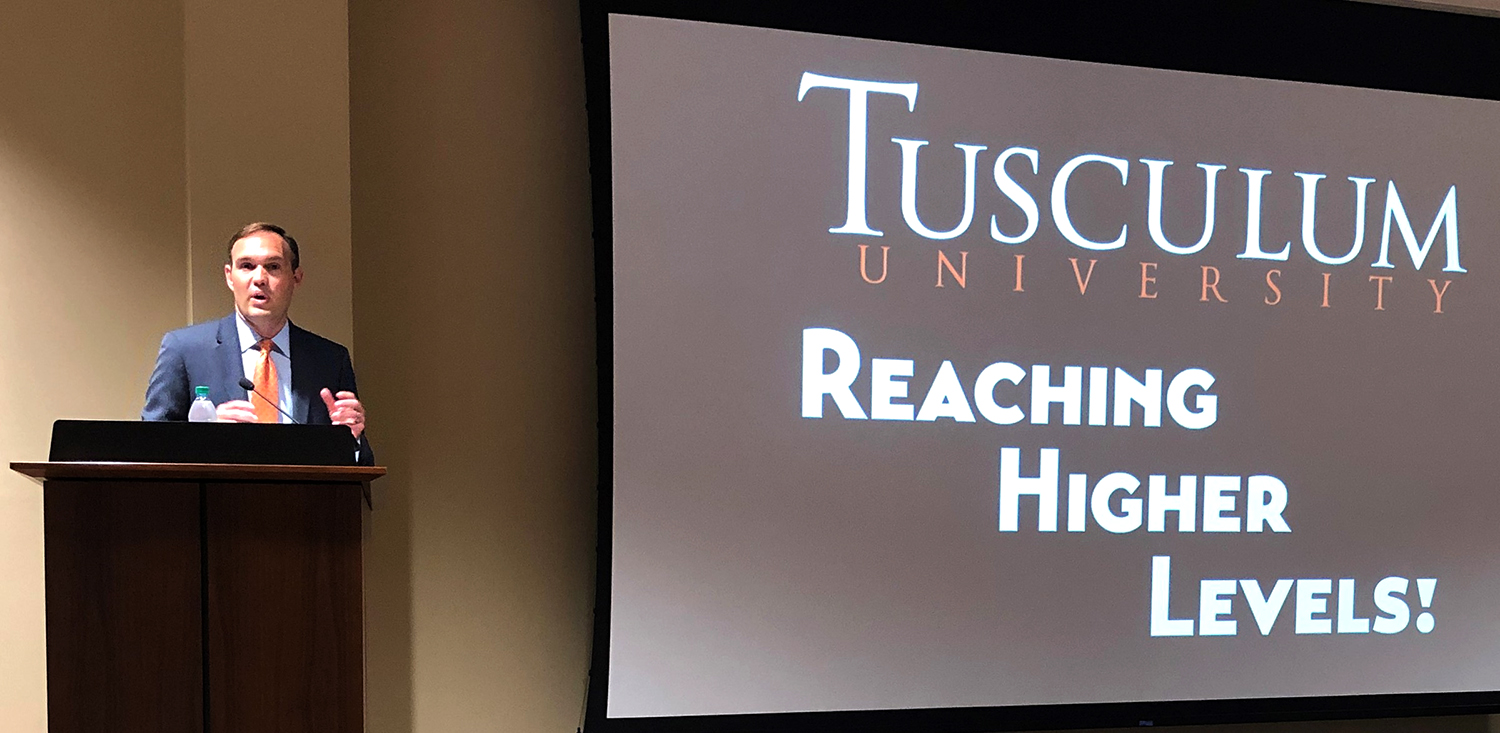Dr. James Hurley, Tusculum University’s president, delivers the news that Tusculum is now classified as a Level V higher education institution.
Tusculum University has achieved another significant milestone in its vision to develop the Niswonger College of Optometry as a national leader in contemporary eye care with its receipt of the green light to offer doctoral degrees.
The Southern Association of Colleges and Schools Commission on Colleges has authorized Tusculum to add doctorates to the menu of degrees available from the university. This clears the way for Tusculum to grant a Doctor of Optometry to those who will graduate from the Niswonger College of Optometry once that college receives required approvals.
“We are progressing nicely on multiple fronts to establish an innovative college of optometry that will serve as a model for comprehensive eye care and address the abundance of ocular disease in Central Appalachia,” said Dr. James Hurley, Tusculum’s president. “The decision by SACSCOC was excellent news, and we are grateful for the organization’s thoughtful and thorough review of our application.”
Tusculum leaders shared the good news during a news conference Tuesday, June 25, in the Meen Center on the Greeneville campus.
As a result of the SACSCOC decision, Tusculum is now classified as a Level V higher education institution, which can offer doctoral degrees in as many as three fields. When Tusculum submitted its application to move from Level III to Level V, it proposed optometry as its first doctoral program, said Dr. Carl Larsen, assistant vice president of academic affairs for institutional effectiveness.
He said the recently completed application process was rigorous and detailed. The request to have a Doctor of Optometry increased the complexity because of the nature of the facilities, equipment and faculty the Niswonger College of Optometry will use. He said Tusculum needed to detail items such as the curriculum, student support services, information technology, library resources and a financial plan for the Niswonger College of Optometry.
“The collaboration by everyone at Tusculum to achieve doctoral-level status was extremely impressive and demonstrated our commitment to enhance the university’s quality and serve the region,” said Dr. Greg Nelson, chairman of the Tusculum Board of Trustees. “We presented a compelling case that showed we are ready to create the premier college of optometry in the nation. We are excited to have advanced to this stage and are focused on completing the process so we can launch our program.”
As Tusculum pursued the level change, it also worked on securing the necessary approvals from the Accreditation Council of Optometric Education. The Niswonger College of Optometry is seeking accreditation from that organization and has completed the first step in that process. Tusculum projects it will enroll the first class of 70 students in the four-year program in fall 2020, pending the receipt of preliminary approval for accreditation.
Tusculum will have the 24th college of optometry in the country. The first institution of higher education in Tennessee, Tusculum is celebrating its 225th anniversary.
To prepare for the teaching and training of students, Tusculum has worked since December to renovate the Meen Center, a state-of-the-art facility where the Niswonger College of Optometry will be housed. Construction crews have prepared areas Tusculum needs for optometric examination labs, an optics lab, an anatomy lab, a primary care ophthalmic surgery suite and patient exam rooms.
This initial work is now complete and will be followed by a second phase that will last about a year, said Dr. Andrew Buzzelli, the Niswonger College of Optometry’s founding dean. Meanwhile, Niswonger College of Optometry leaders have hired all of the program leaders and have selected faculty members to teach students during their first year.
“Throughout this process, we have kept our eye on the primary objective – meeting the needs of people who live and work in Central Appalachia and other parts of rural America,” Dr. Buzzelli said. “Many people in those communities not only have vision issues but also other conditions such as diabetes and high blood pressure that are contributing to their health status.
“We are assembling a first-class team of medical professionals who are trained to look at all potential factors and work closely with primary care physicians and other specialists to transform people’s lives.”




